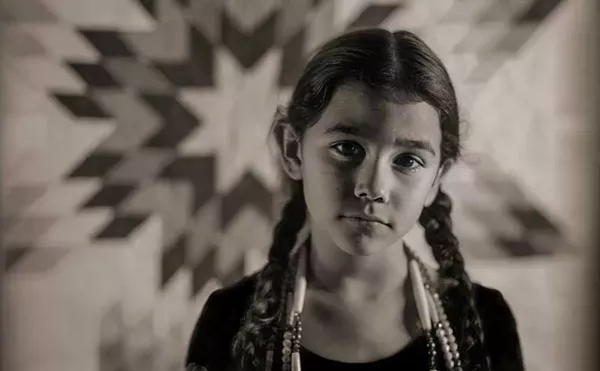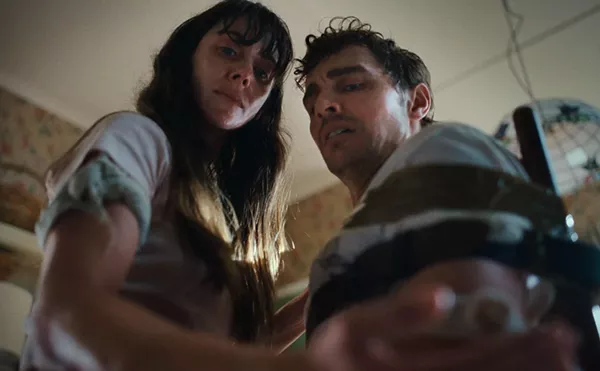
Audio By Carbonatix
[
{
"name": "GPT - Leaderboard - Inline - Content",
"component": "35519556",
"insertPoint": "5th",
"startingPoint": "3",
"requiredCountToDisplay": "3",
"maxInsertions": 100,
"adList": [
{
"adPreset": "LeaderboardInline"
}
]
}
]
Long before Renee Zellweger's brief marriage to country "singer" Kenny Chesney, long before Jack White married model Karen Elson while floating down a Brazilian river, the movie star and the rock star were, as your grandparents might have called 'em, an item. Zellweger spent much time in Detroit, in fact, which was a shocker to us regular folk who spotted her wandering about in supermarkets and dining in restaurants like someone who is, as she calls herself, "just kind of normal" and not, you know, a star actress whose onscreen presence and off-screen grace recalls classic Hollywood.
When asked about this period in her life, she lights up, as she does about everything. See, she's an explosion of sweetness, desperate to compliment you, like she's sincere about helping your day be that much better. "Oh, yeah," she says, drawing the "yeah" out with a few extra vowels. "I'd like to say hi to my friends at the Starbucks on Jefferson. Nice guys." But that's it. Zellweger's a fount of conversation about everything from George Clooney, co-star in this week's football screwball comedy Leatherheads, to the perils of fame and its sometimes debilitating effect on her personal life, not to mention her career as an actress, but don't delve into her romantic past or ask anything about Mr. White. She later points out, in so many words, that it's "journalism" like that that has made her lose faith in the profession altogether.
It's fitting then that Zellweger plays a journalist with murky ethics in Leatherheads, a character generated by the movie's director and star Clooney — no doubt in part because of his own disdain for the paparazzi-journalism espoused by blogger creeps, tabloid mags and "magazine" news shows.
Lexie Littleton is a hotshot and ambitious Chicago reporter with her eye on an associate-editor gig, a position unimaginable to most women in the 1920s. To win the spot, she appeases her editor and goes hunting for a sensational cover story disproving the heroic war history of college football celebrity Carter Rutherford (John Krasinski). Lexie and Carter trade romantic barbs as she wheedles the truth out of him, all while Dodge Connelly (Clooney), who's captain of the Duluth Bulldogs, a professional football team in an era when "professional football" struggled to sell tickets, tries to legitimize his sport by recruiting Carter. The role, which requires Zellweger to spit dialogue out at rates approaching those of Rosalind Russell in His Girl Friday — a major influence on Clooney when making Leatherheads — is the actress' sixth live-action period movie in a row requiring her to slip into unfamiliar time periods and costumes — not counting Bridget Jones: The Edge of Reason, which just required her to slip into an accent and pack on 35 pounds of chub. Miss Potter, Cinderella Man, Cold Mountain, Down with Love, Chicago — yeah, Zellweger loves to play dress-up.
"I find the further removed the character's reality is removed from my own, the more fun it is," she says, sitting at the Beverly Hills Four Seasons, still wearing the unusual platinum hair you might have seen at the Oscars this year ("A sparkling dress required a little old-fashioned Hollywood platinum," she points out). "I really enjoy [period movies]. I love them. In fact, I'm so much more comfortable in corsets or '20s dresses than just being the girl who looks like me and might have the same wardrobe as I do. I don't feel too safe playing the girl who looks like me; there's not enough to hide behind."
One gets the impression that Zellweger hides behind a protective facade when others are watching, whether it's Lexie's colorful coats, her own Oscar-ready platinum hair, or how she nervously encourages journalists to talk as much as she does from behind her press microphone. She insists she didn't think about what she looked like growing up — that was something she learned much later in life in Hollywood. But, as much as this might all be true, the distance between her and the rest of the celeb-eyed world leaves her with a sense of yearning.
"It's the hardest part of my job," she says. "I have the most difficult time with the days people don't see you, hear you, or communicate with you beyond who they perceive you to be before they meet you. I have a hard time with that. I work every day to neutralize it, and to be the person who's standing here. That's all I know."
Is it harder now than in the years that followed her breakthrough role in Jerry Maguire? "I guess so," she says.
"Because I'm older right now, and the things I really care about are hardest to come by because of [my celebrity]. As an actress, you draw on the truth of experiences and I can't draw on the truth of experiences from 20 years ago because that was the last real exchange I had with a person. I want to have real conversations. I want to be a fly on the wall in a room. I know it sounds crazy, but, boy, I cherish it when somebody's mean [to me] because they're having a bad day and they don't recognize [that] I know Tom Cruise and alter their behavior in some way. I love it when the stewardess is just nasty. I do. It makes me shrink when she comes back and apologizes because she didn't realize [who I was], know what I mean?"
No, we don't. Conversely — and this despite how much Zellweger proclaims that she loves to be treated poorly these days because, one supposes, it feels real — she can't be callous back because of how journalists (not like us, of course) will report it. "They write articles about the bad day they think you're having," she says, laughing. She quotes one: "'Her body language definitely indicated she was upset with this person.' Seriously, I read that."
While you might have trouble sympathizing with a beautiful, talented actress who gets paid millions of dollars to do what she loves, she does have a point about celebrity "journalism" and journalism in general, which is probably why she enjoyed playing Lexie Littleton so much.
"I don't know if I'd like her job a lot," Zellweger says. "I understand the responsibility journalists have to reporting the truth, I appreciate that. [But] we're at an interesting crossroads right now; I find there isn't much accountability anymore, and you don't necessarily have to report the truth, you just have to be first." Like Littleton in her exposure of Carter Rutherford as a fraud. "News has become a commodity and that's frightening to me because I think there's a better way to make money.
"I don't know if I'd be comfortable with having that much responsibility in shaping another person's life," she concludes. "Especially if I knew I could damage it." And being on the other side of that sort of reporting is something Zellweger knows a lot about.
Leatherheads opens Friday, April 4.
Cole Haddon writes about film for Metro Times. Send comments to letters@metrotimes.com




